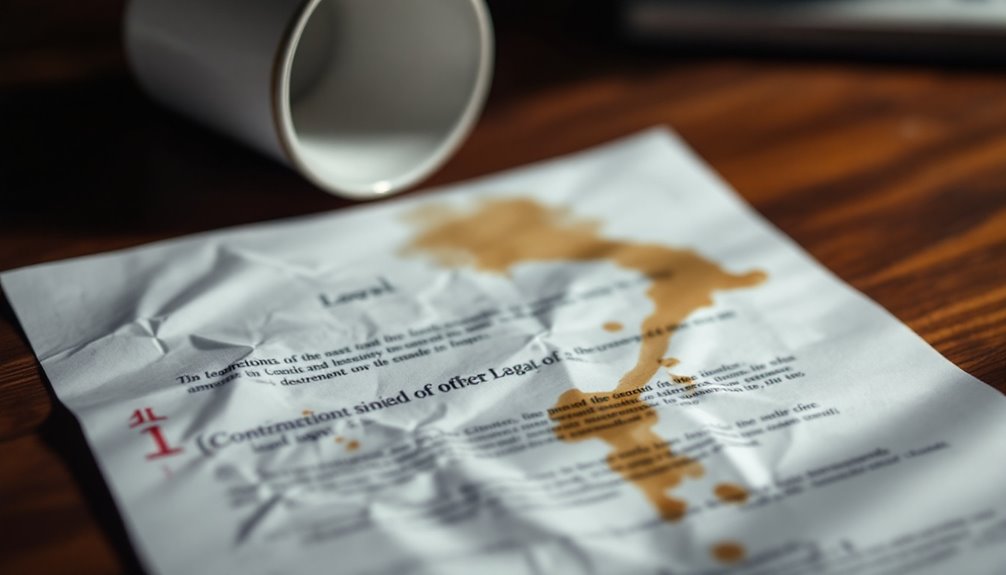Personal injury lawyers typically increase settlement amounts by 3.5 times compared to self-represented cases, with average settlements of $113,391 versus $17,600. Minor injuries with clear fault and simple negotiations can be handled alone. However, complex cases involving serious injuries, disputed liability, or multiple parties need legal expertise. Lawyers work on contingency fees, meaning no upfront costs. Understanding when legal representation makes sense can mean the difference between fair compensation and settling for less.
Key Takeaways
- Lawyers secure settlements 3.5 times higher than self-represented cases, averaging $113,391 versus $17,600 for those without legal representation.
- Minor injuries with clear liability and fair insurance offers can be settled without a lawyer to save on legal fees.
- Complex cases involving serious injuries, disputed liability, or multiple parties strongly benefit from professional legal representation.
- Personal injury attorneys provide expert evaluation, handle documentation, and negotiate with insurance companies while you focus on recovery.
- Cases with lawyers achieve settlements 91% of the time, making legal representation crucial for maximizing compensation in significant injury claims.
Understanding Personal Injury Claims and Legal Representation

Every personal injury claim presents unique challenges that require careful consideration. The process involves complex legal rules and medical issues that can be hard to understand. Personal injury settlements depend heavily on gathering strong evidence and expert testimony to prove fault.
When dealing with liability insurance companies, victims face experienced adjusters who aim to minimize payouts. Legal disputes often require understanding complex medical reports and accident reconstruction details. The process demands knowledge of legal procedures and deadlines that must be followed strictly.
Time is critical in personal injury cases. Missing the statute of limitations can prevent victims from seeking compensation. Evidence needs to be collected quickly, and witness statements must be secured early. Professional legal guidance can help navigate these challenges while meeting all required deadlines.
Key Benefits of Hiring a Personal Injury Attorney
Hiring a personal injury attorney offers several important advantages for accident victims. These legal professionals possess deep knowledge of personal injury laws and understand how to protect their clients' legal rights throughout the claims process. They handle complex paperwork, meet deadlines, and navigate court procedures while victims focus on recovery. Personal injury lawyers also excel at negotiation with insurers, often securing higher settlements than individuals could achieve alone.
- Expert evaluation of claim value including future medical costs
- Strategic negotiation tactics against insurance companies
- Professional handling of legal documentation and deadlines
- Strong representation in court if settlement fails
- Thorough gathering of evidence and expert testimony
These benefits make attorneys particularly valuable in serious injury cases where significant compensation is at stake. Their expertise helps guarantee victims receive fair treatment and maximum compensation for their injuries.
The Real Impact of Legal Representation on Settlement Amounts

Through extensive research and data analysis, the financial impact of legal representation in personal injury cases is clear and significant. Studies show victims with lawyers receive settlements 3.5 times higher than those who self-represent. Even after paying attorney fees, clients still walk away with triple the compensation.
The average personal injury settlement from 2016 to 2023 reached $113,391, with significant variations based on case type. Car accidents averaged $37,248, while truck accidents reached $103,654. Under negligence law, attorneys help maximize both economic and non-economic damages. They effectively argue for pain and suffering compensation while documenting medical expenses and lost wages. In some instances, the most outrageous personal injury settlements have reached millions of dollars, particularly in cases involving severe injuries or corporate negligence. These high-value settlements often stem from extensive litigation, expert testimonies, and compelling evidence of long-term suffering. Skilled attorneys leverage these factors to negotiate maximum compensation for their clients.
Insurance data reveals that 85% of bodily injury payouts went to clients with legal representation, confirming the substantial value attorneys bring to settlement amounts.
When You Should Handle Your Claim Without a Lawyer
Many personal injury claims can be handled successfully without legal representation. When injuries are minor and medical treatment is minimal, hiring a lawyer may not be necessary or cost-effective. In cases where fault is clear and compensation is fair, dealing directly with insurance companies can lead to satisfactory outcomes.
- Injuries involve only sprains, strains, or minor discomfort
- Medical expenses are low and treatment is short-term
- The responsible party accepts fault without dispute
- Insurance company offers fair compensation that covers losses
- No complex legal issues or extensive negotiations required
These situations typically allow individuals to navigate the claims process independently. When medical costs are minimal, work absence is brief, and the settlement offer adequately covers damages, handling the claim without legal representation can save both time and money.
Critical Factors in Deciding to Hire Legal Help

The decision to hire legal representation involves several key considerations. Case complexity, injury severity, and the number of parties involved are primary factors in determining if legal advice is necessary. When multiple vehicles or disputed liability exists, specialized knowledge becomes vital for managing complex legal procedures.
Another critical factor is the opponent's financial resources. If facing a large company or wealthy individual with strong legal backing, having professional representation levels the playing field. The lawyer's negotiation skills can substantially impact settlement amounts, especially when dealing with insurance companies. Additionally, cases requiring expert witnesses or extensive medical documentation benefit from an attorney's established professional network. Their experience in similar cases helps assess fair compensation and increases the likelihood of a favorable outcome.
Success Rates: Comparing Cases With and Without Attorneys
Statistical data shows a stark difference in success rates between represented and self-represented personal injury cases. Cases with attorneys achieve settlements 91% of the time, while those without legal representation rarely secure favorable outcomes. The financial impact is significant, as plaintiffs with lawyers typically receive settlements three times larger than those who handle cases alone. Furthermore, having legal representation not only increases the likelihood of securing a favorable settlement but also enhances the overall claim process. This is particularly important in complex legal matters, such as selfdefense claims in the bay area, where navigating local laws and court procedures can be daunting for individuals without legal expertise. As a result, hiring an attorney can be a crucial step in ensuring that plaintiffs not only receive fair compensation but also understand their rights throughout the legal journey.
Settlement Rates By Representation
Raw numbers tell a compelling story about personal injury settlements. Cases with attorney representation average $113,391 in compensation, while those without lawyers typically settle for just $17,600. These settlement rates reveal a stark difference in negotiation outcomes based on legal representation.
- Attorneys secure settlements 3-4 times higher than self-represented cases
- Lawyers effectively counter insurance company tactics
- Legal representation guarantees full coverage of medical bills and suffering
- Professional negotiation skills lead to better compensation
- Attorney knowledge helps maximize case value
The data clearly shows that having a lawyer substantially impacts settlement amounts. Insurance companies often take advantage of individuals without legal representation, leading to much lower payouts. While simple cases might not require an attorney, complex situations benefit substantially from professional legal guidance.
Financial Impact Of Lawyers
Compensation success rates paint a clear picture when comparing legal representation outcomes. Studies show that hiring a personal injury lawyer leads to substantially higher settlements, with plaintiffs receiving an average of $45,500 compared to $23,000 for those without representation. This discrepancy highlights the importance of legal expertise in navigating the complexities of the claims process. Injury claim payout evaluations consistently reveal that well-represented plaintiffs are more likely to achieve favorable outcomes, as attorneys possess the skills to negotiate effectively and advocate for their clients’ rights. Consequently, individuals pursuing compensation for injuries should consider enlisting professional legal assistance to maximize their potential settlements.
Working on a contingency basis, lawyers eliminate upfront costs for clients while securing settlements that are typically three to four times higher than initial insurance offers. Their expertise in accurate claim valuation guarantees that all damages are properly calculated, including medical expenses, lost wages, and non-economic losses. By leveraging their negotiation skills, these attorneys also ensure that clients receive compensation that reflects the true value of their claims, taking into account any hidden costs of divorce that might arise in the future. This comprehensive approach not only maximizes the financial outcome for their clients but also provides peace of mind, knowing that all aspects of their circumstances are being addressed. Clients can focus on their recovery while trusting that their legal representation is safeguarding their interests every step of the way.
The financial impact of legal representation extends beyond immediate compensation. Lawyers factor in long-term care needs, lifetime costs, and future earning potential. Their negotiation experience and understanding of insurance company tactics help maximize settlements while protecting clients' rights throughout the process.
Timeline Expectations for Personal Injury Cases

Personal injury cases typically follow four distinct phases, each with its own timeline. The process begins with documentation and medical care, followed by filing the lawsuit and defendant response. Settlement negotiations may occur at any point, though they're most common after discovery. Personal injury lawyers guide clients through these phases, which can last from months to years depending on liability disputes and case complexity.
- Initial phase with medical care and evidence gathering: Few days to weeks
- Filing lawsuit and receiving defendant response: 1-3 months
- Discovery phase and settlement negotiations: 6-12 months
- Trial and resolution (if needed): 1-2 years or longer
- Appeals process (when applicable): Additional months to years
Most cases settle out of court within 6-12 months, but complex cases with serious injuries may take longer to resolve.
The Cost-Benefit Analysis of Legal Representation
Making an informed decision about legal representation requires careful analysis of costs versus potential benefits. Personal injury lawyers typically work on a contingency fee basis, charging 25-40% of the final settlement. This means clients pay nothing upfront and only pay if they win.
The value of legal expertise often outweighs the contingency fee, especially in complex cases. Lawyers bring professional settlement negotiation skills and deep knowledge of personal injury law. They handle paperwork, meet deadlines, and advance court costs.
Studies show represented clients usually receive higher settlements, even after attorney fees. This is because lawyers know how to value cases properly and can counter insurance company tactics. The risk-free nature of contingency fees makes legal representation accessible to anyone seeking justice for their injuries.
Common Mistakes in Self-Represented Cases

Self-represented individuals often make critical errors that can derail their personal injury claims. Without legal expertise, they frequently miss essential deadlines and commit procedural errors that can lead to case dismissals. Many fail to gather sufficient evidence or properly organize documentation, weakening their position during negotiations. Insurance companies often take advantage of their limited negotiation skills, resulting in settlements far below the claim's actual value.
- Missing critical filing deadlines and statute of limitations
- Providing recorded statements to insurance companies without legal guidance
- Failing to collect and preserve essential evidence from the accident
- Signing documents without understanding their legal implications
- Underestimating the true value of injuries and damages
These mistakes can substantially impact the outcome of a personal injury case, potentially leaving victims with inadequate compensation for their injuries and losses.
Expert Witnesses and Their Role in Case Success
While self-representation can lead to costly mistakes, expert witnesses often make the difference between winning and losing a personal injury case. These specialists help explain complex technical information to judges and juries in clear, understandable terms.
Expert witnesses play vital roles in establishing liability and causation. Medical experts connect injuries to accidents, while accident reconstruction specialists explain how incidents occurred. In workplace injury cases, safety experts evaluate if proper protocols were followed.
Their testimony substantially influences settlements and trial outcomes. Financial experts calculate damages, including future medical costs and lost wages. Their professional opinions carry substantial weight with juries and can drive settlement negotiations. When challenged during cross-examination, qualified experts defend their findings with credible, evidence-based explanations, strengthening the overall case for their side.
Statistical Evidence on Settlement Outcomes

Research shows that hiring a personal injury lawyer leads to settlements nearly three times higher than handling cases alone. Data indicates 91% of people with attorneys receive payouts, compared to just 51% of those representing themselves. The numbers clearly demonstrate that legal representation improves both success rates and settlement amounts, with represented clients receiving an average of $30,700 more than those who accept initial insurance offers.
Proven Settlement Success Rates
Settlement success rates paint a clear picture of personal injury case outcomes. Studies show personal injury lawyers achieve significant results, with 95-96% of tort claims settling before trial. When cases do go to court, plaintiffs win about half the time, with better outcomes in bench trials compared to jury trials.
- Motor vehicle accidents have the highest success rate at 61-64%
- Medical malpractice claims show lower success rates at 19-23%
- Dog bite cases achieve impressive 75% success rates
- Premises liability cases succeed about 38% of the time
- Average settlements range from $3,000 to $25,000
Settlement outcomes vary based on key factors like liability clarity, injury severity, and available insurance coverage. The data shows most cases resolve through negotiation, with only 4-5% proceeding to trial. Two-thirds of claimants receive compensation, with average payouts around $52,900.
Lawyer vs. Self-Settlement Payouts
The financial difference between lawyer-assisted and self-handled settlements reveals a stark contrast. Studies show personal injury lawyers help clients receive settlements 3.5 times higher than those without legal representation. Even after attorney fees, represented clients still get three times more compensation.
Insurance data confirms this trend, with 85% of bodily injury payouts going to people with attorneys. Success rates also differ substantially – 91% of those with lawyers receive compensation, compared to only 51% of those handling cases alone.
While attorney fees typically range from 20% to 30% of settlements, the lawyer vs. self-settlement payouts clearly favor legal representation. Insurance companies often offer lower settlements to unrepresented individuals, making lawyer assistance valuable despite the fees.
Frequently Asked Questions
Can I Switch Personal Injury Lawyers in the Middle of My Case?
Yes, clients can switch personal injury lawyers during their case. They should secure a new attorney before ending ties with the current one. The new lawyer will handle the paperwork and coordinate with the previous attorney about fees. However, timing matters – switching too close to trial dates may require court approval. While the change might cause a brief delay, it won't affect the total contingency fees or harm the case's outcome.
What Happens if My Personal Injury Lawyer Dies During My Case?
If a personal injury lawyer dies during a case, the legal process continues but may face temporary delays. The client has the right to choose a new attorney to take over. The new lawyer will need time to review all case files and evidence. The deceased lawyer's firm often helps with the handover. All client rights remain protected, and the new attorney must maintain the same professional standards and case strategies.
Do Personal Injury Lawyers Handle Worker's Compensation Cases Differently Than Accidents?
While both involve injuries, workers' compensation and personal injury cases follow very different paths. Workers' comp is a no-fault system focusing on work-related injuries, with specific state deadlines and requirements. Personal injury cases require proving someone else was at fault. Lawyers approach workers' comp cases with more emphasis on documentation and strict filing deadlines, while personal injury cases need evidence of negligence and allow for pain and suffering damages.
How Do Personal Injury Lawyers Split Fees When Multiple Firms Collaborate?
Personal injury lawyers split fees between firms based on specific rules and agreements. They must get client consent in writing and clearly explain how the fees will be divided. The split can be based on work performed by each firm or joint responsibility for the case. The total fee must be reasonable and not increase due to the sharing arrangement. All fee-sharing must follow state laws and professional regulations.
Can Insurance Companies Refuse to Work With Certain Personal Injury Lawyers?
Like a restaurant can’t ban food critics, insurance companies cannot legally refuse to work with specific personal injury lawyers. While insurers may dislike certain attorneys known for aggressive litigation, they must engage professionally with any licensed lawyer representing a claimant. However, they can make the process more challenging through tactics like delayed responses or excessive documentation requests. The law requires insurers to handle claims in good faith, regardless of the representing attorney. This obligation to operate in good faith is crucial for maintaining fairness and trust in the legal process. Similarly, just as personal injury lawyers navigate the complexities of insurance claims, startups must also understand the business lawyer importance for startups when establishing their ventures. A knowledgeable business lawyer can help new companies navigate regulations, contracts, and potential disputes, ensuring they build a solid foundation for success.
Conclusion
Like a skilled navigator through stormy seas, a personal injury lawyer can steer your case toward a successful outcome when the waters are rough. The decision to hire one depends on your unique situation. For simple cases, handling it alone might work. But when injuries are serious or liability is unclear, legal help often pays for itself. The key is weighing the complexity of your case against the potential benefits of professional guidance.
